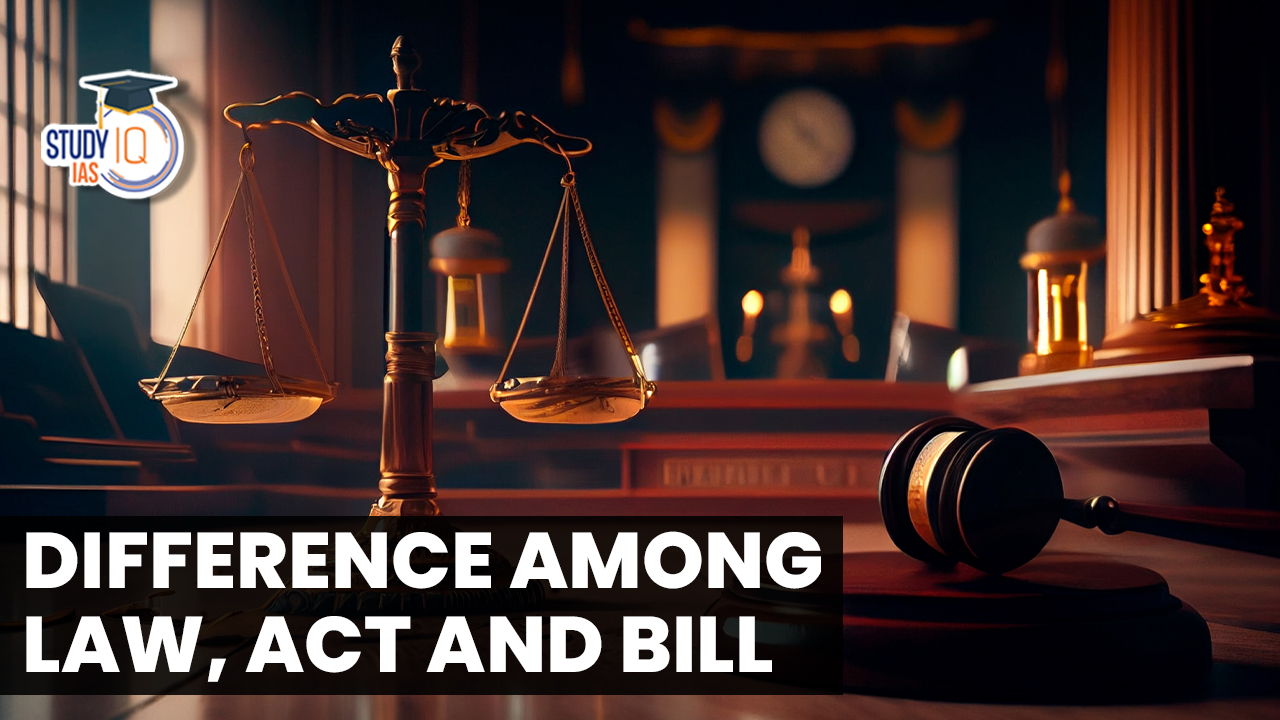Table of Contents
Difference Between Law, Act and Bill
Law, Act, and Bill are terms used in the legislative process to refer to different stages and forms of legal instruments. While these terms might seem interconnected, each holds a distinct significance within the framework of a country’s governance. Understanding the Difference Between Law, Act, and Bill is crucial to grasp the stages and progression of legislative procedures and how they shape the legal landscape of a nation. Delving into the nuances of these terms will shed light on their individual roles, from the initial stages of formulation to their eventual implementation, and the impact they have on society and the rule of law.
Definition of Law, Act and Bill
The terms Law, Act and Bill represent distinct stages in the legislative process. A law is a binding set of rules enforced by a governing authority. An Act is a formal written document that embodies a law, created through the legislative process and carrying legal weight. A Bill, on the other hand, is a proposed law undergoing consideration in a legislative body. It evolves into an Act upon approval, which, once enforced, becomes a law.
Major Difference Between Law, Act and Bill
Here is the Major Difference Between Law, Act and Bill described in detail.
| Aspect | Law | Act | Bill |
| Definition | A set of rules and regulations enforced by a governing authority, applicable to all citizens within the jurisdiction. | A formal written document that has been passed by the legislature and enacted into law. | A proposed legislation that is under consideration by the legislature and has not yet become law. |
| Legal Status | Legally binding and enforceable by the judiciary. | Legally binding and enforceable by the judiciary after it is passed and enacted. | Not yet legally binding until it is passed and enacted into law. |
| Stage in Legislative Process | Represents the final stage in the legislative process after a Bill is passed and becomes enacted. | Represents the final stage of a proposed legislation’s journey through the legislature before becoming enacted. | Represents the initial stage of proposed legislation being introduced in the legislature. |
| Application | Applicable to all citizens and entities within the country’s jurisdiction. | Applicable to all citizens and entities within the country’s jurisdiction once enacted. | Not applicable until it is passed and enacted into law. |
| Enactment | Already enacted and in force. | Needs to be passed by the legislature and enacted into law to become enforceable. | Not yet enacted and depends on the approval and passage through the legislative process. |
| Scope and Coverage | Can cover a wide range of legal areas and issues. | Specific in scope, targeting a particular subject or area of law. | Specific in scope, focusing on a particular issue or area of law. |
| Authority | Derived from the Indian Constitution or legislative body of a country. | Derived from the Constitution or legislative body after being passed. | Derived from the Constitution or legislative body if passed and enacted. |
| Duration | Indefinite until it is amended or repealed by the legislative body. | Indefinite until it is amended or repealed by the legislative body. | Temporary and only applicable during the legislative process; ceases to exist if not passed and enacted. |
| Examples | Indian Penal Code (IPC) in India, Civil Rights Act in the United States. | Companies Act in India, Goods and Services Tax (GST) Act in India. | The Citizenship (Amendment) Bill, 2023 in India, Affordable Housing Bill in the United States. |
| Legislative Process | Not part of the legislative process but represents the outcome of that process. | Part of the legislative process represents the final outcome after being passed by both houses. | Part of the legislative process represents a proposal and must be passed by both houses to become an Act. |
| Purpose | Serves as a comprehensive legal framework for governance and societal regulation. | Implements specific policies and addresses focused issues within the legal framework. | Initiates legal changes or introduces new laws to address specific problems or concerns. |
| Revision and Amendments | Can be revised, amended, or repealed through a legislative process. | Can be revised, amended, or repealed through a legislative process. | Can be revised, amended, or abandoned during the legislative process or before becoming law. |
| Legislator’s Role | Not directly involved in the legislative process. | Involved in the legislative process and plays a role in debating and voting on the proposed legislation. | Introduces, debates, and votes on the proposed legislation during the legislative process. |
| Public Input | Generally, there is no public input required during the enactment of the Law. | Public consultation and debates may occur before the Act is passed. | Public consultation and debates may occur during the consideration of the Bill in the legislature. |
| Legal Implications | Violation of the Law can lead to legal penalties, fines, or imprisonment. | Violation of the Act can lead to legal penalties, fines, or imprisonment. | Violation of the Bill, as it is not yet law, does not incur legal penalties. |
| Implementation | Already in effect and implemented by law enforcement agencies and courts. | Implemented by relevant authorities after enactment and may have a specified effective date. | Only implemented after becoming law, if passed and enacted. |
| Legislative Priority | Not subject to annual legislative cycles and remains in force until amended or repealed. | May be subject to annual legislative cycles, with amendments and new Acts passed each year. | Subject to the legislative calendar and must be passed within a specific session to become an Act. |


 Union Territories of India with Capital,...
Union Territories of India with Capital,...
 Strengthening Parliamentary Oversight in...
Strengthening Parliamentary Oversight in...
 Private Member Bill, Key Provisions, Sig...
Private Member Bill, Key Provisions, Sig...





















